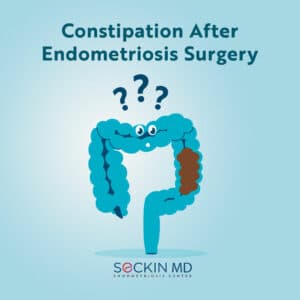Constipation After Endometriosis Surgery

Endometriosis is best treated with laparoscopic deep excision surgery. This technique, though the gold standard, has some post-operative effects such as shoulder pain, light bleeding, and temporary bowel regime changes that patients should be aware of. Read this article to find out more about constipation after endometriosis surgery.
What is constipation?
Constipation refers to difficulty in passing stools or passing fewer than three stools a week. Constipation is a general problem that can occur due to a lack of fiber or fluids in your diet, but it may also be indicative of other diseases such as endometriosis. Endometriosis can affect bowel movements with symptoms such as diarrhea, constipation, and nausea.
How endometriosis affects the bowels
More than 90% of patients with endometriosis have gastrointestinal (GI) symptoms. They are also twice as likely as others to have irritable bowel syndrome (IBS), the symptoms of which signifiantly overlap with those of endometriosis making diagnosis difficult.
The majority of bowel endometriosis cases involve the rectum and large intestine, while 10% of cases can involve the appendix and the ileum. Bowel endometriosis can manifest as painful bowel movements, constipation, bloating, bloody stools, and painful sex.
Does endometriosis surgery cause constipation?
Post-operative constipation is also a common occurrence. There can be several reasons for this including anesthesia, pain medications, and diet. After endometriosis surgery, it is common to experience a “sleepy” bowel. However, it is important to ensure that it doesn’t lead to constipation.
Constipation is especially common after the surgical treatment of rectal endometriosis. Factors contributing to this include denervation of the colon, transanal stapler, and reduced rectal reservoir that can decrease pressure on the anal sphincter muscle.
A recent study showed that post-operative constipation was present in 70% of 153 patients undergoing laparoscopy for gynecological disorders.
How to care for your bowel after endometriosis surgery?
Your doctor will be able to suggest a personalized bowel regimen following endometriosis surgery. Although it is best to avoid heavy exercise immediately after surgery, light walking can help increase bowel movement and reduce the risk of constipation.
Depending on your symptoms, your doctor may also prescribe stimulants and laxatives till regular bowel movements resume. However, not all laxatives work the same for all individuals so consult your doctor if your symptoms do not improve.
Dietary fiber is also important to ensure efficient bowel motion. However, it is not recommended to have a heavy fiber diet or supplementation right after surgery as it can worsen constipation.
Did you experience constipation following endometriosis surgery? Place share your experience with others if you wish by leaving a comment on Facebook or Instagram.
Get a Second Opinion
Our endometriosis specialists are dedicated to providing patients with expert care. Whether you have been diagnosed or are looking to find a doctor, they are ready to help.Our office is located on 872 Fifth Avenue New York, NY 10065.
You may call us at (646) 960-3080 or have your case reviewed by clicking here.